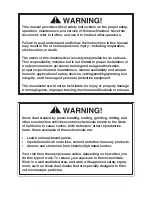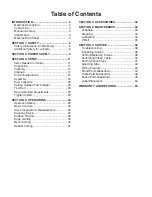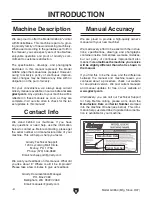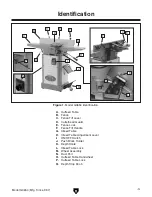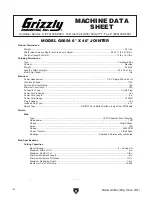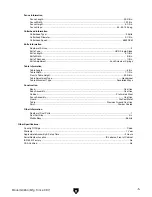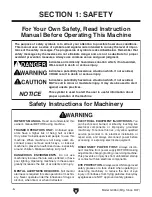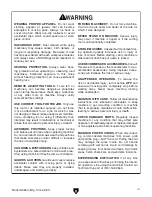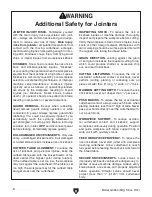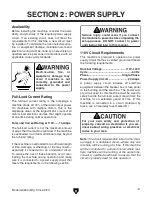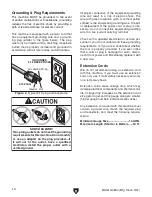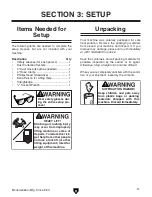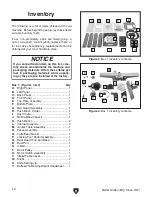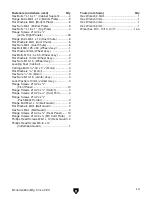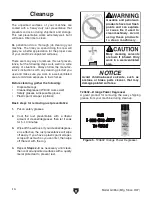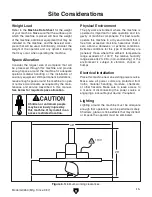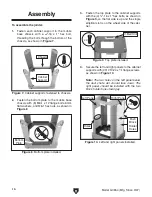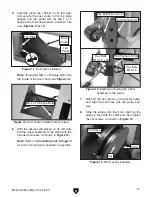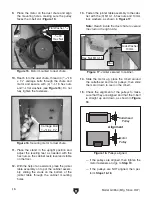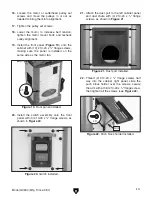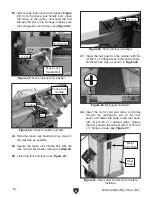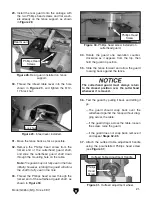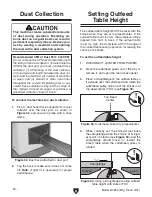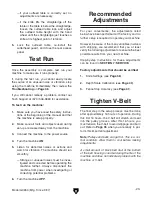
-8-
Model G0654 (Mfg. Since 9/07)
JOINTER INJuRy RISKS. Familiarize yourself
with the main injury risks associated with joint-
ers—always use common sense and good judge-
ment to reduce your risk of injury.
Main injury
risks from jointers: amputation/lacerations from
contact with the moving cutterhead, entangle-
ment/crushing injuries from getting caught in mov-
ing parts, blindness or eye injury from flying wood
chips, or impact injuries from workpiece kickback.
KIcKBAcK. Know how to reduce the risk of kick-
back and kickback-related injuries. “Kickback”
occurs during the operation when the workpiece is
ejected from the machine at a high rate of speed.
Kickback is commonly caused by poor workpiece
selection, unsafe feeding techniques, or improper
machine setup/maintenance. Kickback injuries
typically occur as follows: (1) operator/bystanders
are struck by the workpiece, resulting in impact
injuries (i.e., blindness, broken bones, bruises,
death); (2) operator’s hands are pulled into blade,
resulting in amputation or severe lacerations.
GuARD REMOvAL. except when rabbeting,
never remove guards during operation or while
connected to power. always replace guard after
rabbeting. you could be seriously injured if you
accidentally touch the spinning cutterhead or
get entangled in moving parts. Before removing
sawdust, turn jointer
OFF and disconnect power
before clearing. immediately replace guards.
DuLL/DAMAGED KNIvES/INSERTS. only use
sharp, undamaged knives/inserts. dull, damaged
or rusted knives/inserts increase risk of kickback.
OuTfEED TABLE ALIGNMENT. to reduce the
risk of kickback and personal injuries, keep the
outfeed table even with the knives/inserts at top
dead center (the highest point during rotation).
if the outfeed table is set too low, the workpiece
may rock against the cutterhead. if the table is set
too high, the workpiece may hit the outfeed table
and get stuck over the cutterhead.
INSpEcTING STOcK. to reduce the risk of
kickback injuries or machine damage, thoroughly
inspect and prepare the workpiece before cutting.
verify the workpiece is free of nails, staples, loose
knots or other foreign material. Workpieces with
minor warping should be surface planed first with
the cupped side facing the infeed table.
GRAIN DIREcTION. Jointing against the grain
or end grain increases the required cutting force,
which could produce chatter or excessive chip
out, and lead to kickback.
cuTTING LIMITATIONS. to reduce the risk of
accidental cutterhead contact or kickback, never
perform jointing, planing, or rabbeting cuts on
pieces smaller than 8" long,
3
⁄
4
" wide, or
1
⁄
4
" thick.
MAXIMuM cuTTING DEpTh. to reduce the risk
of kickback, never cut deeper than
1
⁄
8
" per pass.
puSh BLOcKS. to reduce the risk of accidental
cutterhead contact, always use push blocks when
planing materials less than 3" high or wide. never
pass your hands directly over the cutterhead with-
out a push block.
WORKpIEcE SuppORT. to reduce acciden-
tal cutterhead contact and kickback, support
workpiece continuously during operation. position
and guide workpiece with fence; support long or
wide stock with auxiliary stands.
fEED WORKpIEcE pROpERLy. to reduce the
risk of kickback, never start jointer with workpiece
touching cutterhead. allow cutterhead to reach
full speed before feeding. never back work toward
the infeed table.
SEcuRE KNIvES/INSERTS. loose knives or
improperly set inserts can become dangerous pro-
jectiles or cause machine damage. always verify
knives/inserts are secure and properly adjusted
before operation. straight knives should never
project more than
1
⁄
8
" (0.125") from cutterhead
body.
Additional Safety for Jointers
Содержание G0654
Страница 56: ......


